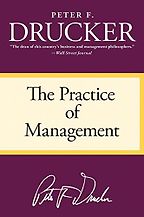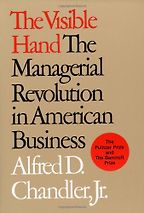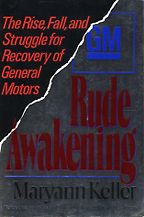Why are you interested in studying the culture of management?
Well, my interest was first stimulated by my elder brother and co-author Ken. As an engineer, he had worked for many different companies in Britain and the US and been struck by the enormous differences which existed in managerial styles between these two countries. Although each enjoyed strengths and weaknesses, the American version was, in his opinion, much superior. This started him off on a lifelong study of what you might call ‘comparative national managerial cultures’. He began to write a book about it way back in the 1970s, but regrettably took ill and became a chronic invalid soon after. As a result, his book would be put on hold for many years. About seven years ago, I said to him that it was a very important book and persuaded him that we should try to produce it together and so we co-wrote our book, The Puritan Gift.
What is the ‘gift’ of the title of your book, and how is it relevant to managerial culture?
The Puritan migrants, who went from England to America in the 1630s, brought with them an enormously successful managerial culture which we refer to as the ‘gift’ in our book. In the next three centuries, this gift provided the driving force behind the transformation of 13 tiny colonies into the most powerful nation in the world. Under the US occupation of Japan from 1945 to 1952, America would implant this same culture, metaphorically, in the soil of its defeated enemy, an event which led to the Japanese economic miracle. The story doesn’t end there; the Japanese would teach this same culture to the future ‘Asian Tigers’, including Taiwan, Singapore and South Korea in the 1970s and 1980s. The Taiwanese then passed it to mainland China in the 1990s and to Vietnam in the decade just past. A managerial culture that had its origins in East Anglia before 1600 would conquer a large part of the globe. The Puritans’ gift to America became Japan’s gift to the world. Where will it go from here? Let us hope it reaches large parts of Africa, where it is badly needed to raise the general standard of living.
Tell us about your first choice, The Practice of Management.
The author Peter Drucker was by any standard a remarkable man. He was an Austrian Jew who emigrated to the US in 1933. I got to know him in the 1950s when he was an adviser to the shipping company W R Grace in New York, where I worked as a financial analyst. The Practice of Management describes American managerial culture as it was at the mid-20th century and is a treasure trove of information about the period. Drucker’s choice of title is significant. He saw management neither as an art nor as a science, but as something one did in practice. In our book, my brother and I use a different term, ‘craft’, which we believe to be more precise than ‘practice’, but all of us are getting at the same thing. A craft is something that is learned in practice under the direction of a master. This is precisely how good management was taught and learned in American companies of that period; it was not something that you learned in a class at college.
Next book, The Visible Hand.
The author of this book, Alfred DuPont Chandler was the Professor of Business History at Harvard Business School. As his middle name implies, he was a scion of the family which founded the great chemical company DuPont. In the 1920s, one of its principal customers was General Motors, to which it supplied paint. When the car maker went bankrupt because it was poorly managed, DuPont went to its rescue. DuPont installed good management and created one of the greatest companies of all time. The Visible Hand was published in 1977. Its name is derived from Adam Smith’s ‘invisible hand’ – an expression which implied that free markets were largely self-correcting. Chandler takes a different view, arguing that whatever relevance Smith’s theories may have had in 1776, they did not describe the American economy after 1850. By that time, in his view, ‘administrative co-ordination’ had taken over from ‘market co-ordination’. The former ‘invisible hand’ had been replaced by a ‘visible’ one.
It sounds like Chandler’s book bears upon our current recession. What insights can he bring?
His analysis of the limits of free market economics fell on stony ground when it materialised in 1977. This was a period when the Chicago school of monetarist economics was dominant – people believed that the market could do no wrong. As a result of our current great recession, however, the central thesis of The Visible Hand has come back into its own. Both Drucker’s and Chandler’s books fill in gaps in free market ideology by highlighting the importance of the practice of management.
Next book, Adam Smith’s An Inquiry into the Nature and Cause of the Wealth of Nations.
The Wealth of Nations was the first serious tract on economics in the English language and it profoundly shaped the way people thought about the economy and society. However, it has been seriously misrepresented by people who either have not read it or, if they have done so, overlooked important passages. Many people know Smith’s arguments in favour of free markets but how many people know his thoughts about the failings of market economics? In the book he argues things like: ‘People of the same trade seldom meet together, even for merriment and diversion, but the conversation ends in a conspiracy against the public…’ or the even more damning: ‘Commerce sinks the courage of mankind? The minds of men are contracted and incapable of elevation.’
Your next book elaborates on the content of this good managerial culture. Tell us about Self-Help.
The author Samuel Smiles was a Scot who lived in mid-19th century London. His book promoted the Puritan way of life, propagating both the virtues of early Victorian enterprise as well as its author’s own social idealism. An interesting aspect of the Smiles thesis is that he did not regard self-help as selfish – the concept was indissolubly bound up with service to others. The British, who had created the Puritan managerial culture and gave it to America, largely abandoned it in the mid-Victorian era, a century before America. However, it survived and prospers in distant Japan, in part because of Smiles’s book. Within a year of first publication in English, Self-Help had been translated into Japanese, whereupon it became one of ‘the founding texts’ of the Meiji era, the period when Japan rose to be a world power. Smiles’s book inspired a peasant farmer, Sakichi Toyoda, to found a company to manufacture textile machinery; today Sakichi’s great-grandson, Akio Toyoda, chairs its successor, Toyota Motor.
Your last book is a case study of management in practice. Tell us about Rude Awakening: The Rise, Fall and Struggle for Recovery of General Motors.
The book was amazingly prescient. It was written 20 years ago and yet it effectively predicted the bankruptcy of General Motors, which occurred last year. Its author, Maryann Keller, describes how the rule of the ‘number crunchers’ took root in the 1960s, which almost destroyed the company then and there. To understand what is meant by the expression ‘number cruncher’ you have to go back half a century to our golden age of management. As young men (there were few women) rose up the ladder of promotion in the companies of those days, they would not only learn the ‘craft’ of management ‘on the job’ from more senior colleagues, they would also absorb ‘domain knowledge’ about their company’s business. As a result, banks were run by people who knew an awful lot about banking, engineering companies by people who knew a lot about engineering, and so forth. And they all knew a lot about management.
Starting in the late 1960s, however, a new concept appeared on the corporate scene: namely, that management was a ‘profession’ like medicine, dentistry or the law, and that people should acquire a business degree at a college if they wanted to practise it. It was no longer deemed necessary for executives to learn the ‘craft of management’ as they rose through the ranks or, for that matter, to acquire and make use of ‘domain knowledge’. The outcome has been managerial incompetence on a scale inconceivable in earlier generations and extending over much of society.
That makes for a pretty bleak prognosis for the American economy. Can we be optimistic about the future for America?
Yes indeed – America faces formidable problems of all kinds at the present time, as does the entire developed world. However, it possesses an amazing resilience that exceeds that of most other countries. Lots of ‘green shoots’ have already sprouted there – just look at some recent appointments to senior positions! For example at General Electric, the admirable Jeff Immelt (who launched the concept of ‘domain knowledge’) has replaced the dreadful Jack Welch, who perhaps more than anyone else, was responsible for the collapse in US corporate culture after 1970. I am an optimist about the human race and I am even more of an optimist about America.
July 3, 2010. Updated: August 19, 2019
Five Books aims to keep its book recommendations and interviews up to date. If you are the interviewee and would like to update your choice of books (or even just what you say about them) please email us at [email protected]
Five Books interviews are expensive to produce. If you've enjoyed this interview, please support us by donating a small amount.










